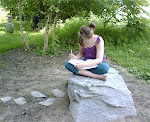Essay Excerpt:
I was making my way to the sad but true ending when it struck me: I could write whatever ending I wanted. In my own stories I could be like God. I could make anything happen. The girls could become friends. It was an extraordinary discovery. Not only did I have the power to invent happier endings than in real life, I could create worlds where people expressed kindness, love, and respect for each other. Not too much later, I learned something perhaps even more remarkable, another pivotal, even life-saving discovery about writing. Not only could I make things up, I could tell the truth.
I had learned by then not to share either my troubles or my joys with my parents. It was best not to risk adding to their burdens of grief and guilt for having survived the Holocaust. So when the children on the school bus searched my head for horns, because their parents told them Jews are devils, I wrote about it. And when my third grade teacher ordered me to stand in front of the class on Passover and eat Wonder Bread or else, I wrote about that. I wrote about everything that happened around me and within me. I wrote freely, addressing the one I believed was safe to tell and who would be glad to listen. The ultimate guardian of secrets and my best friend, God, the one I called HaShem, The Name, became my confidante. HaShem was the invisible presence to be found in gleaming stars, in my dog’s eyes, in the moon, the night’s silence—everywhere, offering me consolation and company in a world wrapped in fear and struggle. In my writing, I could talk about fear, without dreading that my words would hurt my parents. And I could write about joy, despite the fact that I believed I had no right to it. Under my pillow with a flashlight sneaked from the kitchen, I wrote about spinning naked in the meadow until falling down in the tall sizzling grass, happy—in spite of The War.
Writing has always been my lifeline. It is not only the way I express my deepest thoughts and feelings, it is the way I find out what they are. Writing is a way to meet myself in my own heart. Words are the vessels in which I carry the treasure discovered there, beautiful or not, to the world. The eagerness and inner excitement with which I awaited learning to write, still accompany me over fifty years later, as I approach the blank page, and the blank screen. Words are no less wondrous to me now….
Between the ages of 10 and 12, I attended a Hebrew Day School, where one of my teachers, an ecstatic Hassidic rabbi, taught Torah standing on top of his desk. We would explore one word or phrase in Hebrew for hours, holding and turning the words like multifaceted jewels to see what they reflected in the light of our understanding. The Rabbi often had tears of awe in his eyes as we did this. I had moist eyes too, which I tried to hide from my classmates stifling their giggles at our rabbi’s eccentricity. Words continue to be the most mysterious, miraculous, and attractive “objects” in my world. No pleasure, play, or work is more sublime than choosing and arranging them to convey meaning, beauty, and inspiration.



No comments:
Post a Comment